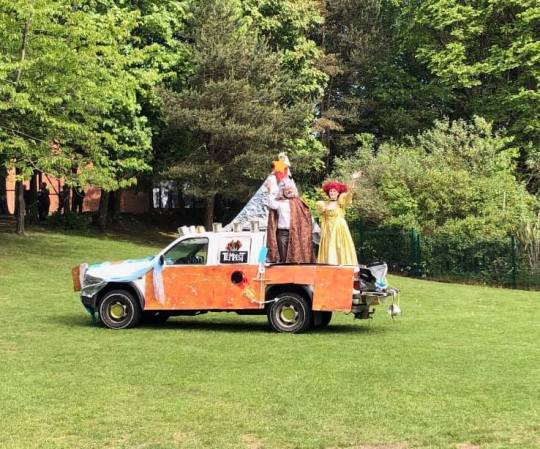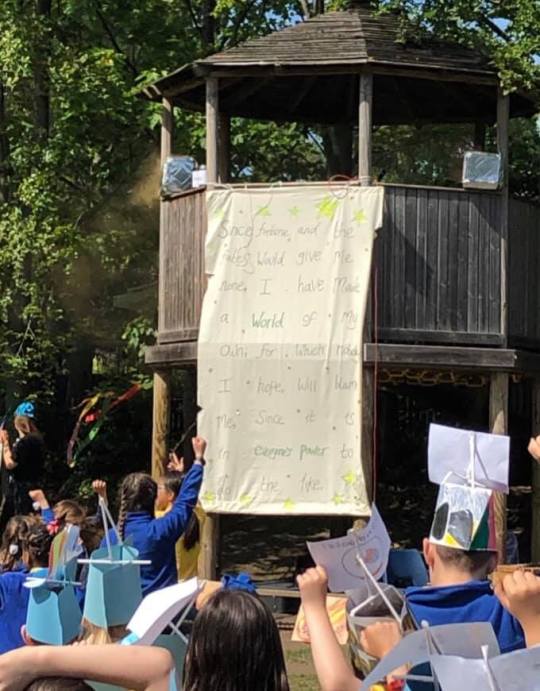Finding the weird and making art in Newcastle upon Tyne
Don't wanna be here? Send us removal request.
Text
THE BLAZING WORLD
Creating new narratives to equip us for the new dark ages
I am a teacher at Hotspur Primary School, an inner-city comprehensive school in Newcastle upon Tyne. The school is nationally recognised for its innovative arts projects and high-quality pastoral care for all pupils. In 2019 I led a whole-school art project entitled ‘Utopia Week’, based upon Margaret Cavendish’s 1666 novel ‘The Blazing World.’ The project was pitched as being a memorable and inspirational experience that could raise the aspirations and confidence of pupils. With hindsight it is now easier to see that the project was actually about something different; it was about creating new narratives to help equip the young people to overcome the new dark ages that we may find ourselves in.
‘The Blazing World’ was chosen as the stimulus for a number of reasons:
1. Children really like portals, especially so since the rise of the immensely popular Swedish video game Minecraft. ‘The Blazing World’ is full of portals that allow the Duchess to transport to the Blazing World, a Utopia filled with anthropomorphic animals.
2. As a school we are continually challenging stereotypes. The Science Fiction genre is synonymous with male writers and yet ‘The Blazing World’, a contender for the first Science Fiction novel to be written, was written by the proto-feminist, self-publishing, philosopher, poet and Scientist Margaret Cavendish. ‘The Blazing World’ combines a narrative of a woman in absolute power with a narrative about the possibility of utopian speculation and the liberation of the female soul. If we’re going to need to “woman up” as a society, we could do a lot worse than look to Margaret Cavendish utopian visions for inspiration.
3. Margaret Cavendish was The Duchess of Newcastle. Having this shared connection with the local area empowers the pupils and allows them to take pride in their heritage and community. Surely this is a more important and relatable connection than a history of Kings, Queens and conquests. (Incidentally, as well as having a claim to be the birth place of Science Fiction/Utopias, Newcastle can also be seen as the birth place of Dystopias, with Yevgeny Zamyatin’s 1921 novel We being written whilst the Russian author was living in the city. But that’s for another project.)
In the lead up to the project a flashing portal appeared in the school hall leaving pupils curious about what lay behind or would be happening in the upcoming days. An actor playing Margaret Cavendish then greeted the pupils having arrived through the portal. Frazzled after being transported across space and time, the Duchess of Newcastle explained to the children that her Blazing World utopia, once the envy of the Universe, had fallen into disrepair. Animals are squabbling with one another, each claiming superiority over one another, whilst their environment had become neglected and uncared for. Having heard that the children at Hotspur are caring, creative and inclusive she decided to visit the school to seek help.
Fifteen mixed-year group classes were then allocated a different animal from ‘the Blazing World’ to research about and find out what makes them special before creating flags, banners and special boats hats that celebrated their creature. This all took place over ‘Utopia Week’ in which students from Newcastle University’s School of Literature joined us to deliver workshops on Cavendish, Utopias, Science Fiction, Feminism and Woman’s Writing to the Year 6’s who then imparted this knowledge to the younger children. It all culminated with an immersive theatre event on the Friday where all the tribes joined together to parade across the school field.
The parade was inspired by the immersive 1960s theatre group ‘The Welfare State International’, and their mantra of “making audiences of strangers into a community.” The Welfare State International believed in a moral duty of offering art on the same basis as education and health. The procession had the soundtrack of David Bowie’s Heroes and was led by the Duchess waving on a flat bed truck made up to resemble a bubble spewing, steam-punk inspired ship. The pupils congregated at the end of the school field to share pledges as to what each animal would do to save the Blazing World, perform a flash-mob dance, and play carnival music on marimbas.

With the Duchess’s faith restored she endeavoured to use the pledges to bring the Utopia back to the Blazing World. Speaking to the children from a wooden platform ten-feet off the ground, the Duchess went onto say to the crowd:
“the time has come for me to leave you, and you in turn must return to your own world, which is very lucky to have you. I’m sure that in your lifetimes, Earth will face many challenges of its own. Perhaps you will also see divisions, or great change of other kinds. Maybe the weather will turn, or your own animal species will be forced to fight for their survival. It could happen today, or tomorrow, in 12 years or 1200 years. But I have no fear for this planet you call Earth. For even as a brief visitor I have seen that children like you – all of you - will always rise up to fight for what is right and good. And as long as the small people-people of Hotspur are around, the planet Earth will be in the best of hands.”
She then disappeared amongst a cloud of red smoke to the sound of Daft Punk’s Contact and a banner was draped down the front of the wooden platform with a direct quote from Cavendish’s novel:
“I have made a world of my own; for which nobody, I hope, will blame me, since it is in everyone's power to do the like.”

As a species we use stories as the optimum medium to help us understand the world and live within our own fictions. Unfortunately, the stories we have been telling ourselves over the last twenty-plus years have often been based on dystopias and catastrophic apocalypses. These stories are not suitable to equip those who are part of Generation Z or their younger contemporaries as they face the environmental changes ahead. This is the mobilising, metamodern generation who have grown up with constant internet access on their phones and are able to orchestrate political activism on previously unimaginable scale within less than 48 hours. As John Higgs point out in his inspirational ‘The Future Starts Here’, they oscillate between idealism and pragmatism.
Our news coverage, Hollywood films and best-selling novels tell us the same doom-laden narrative of environmental Armageddon. We struggle to imagine a healthy fiction to live inside and have forgotten what Gary Lachman calls the lost power of the imagination. Or as Higgs succinctly puts it, “The failure of the imagination stops us from steering towards better version of our potential future.” Consequently, one of the first activities as part of the week was for all the pupils to design a utopia. As the above quote by Cavendish points out, surely the first stage of creating a better future is to imagine one.
Older narratives of protagonists righteously pursuing their individual liberty don’t seem to be as relevant for Generation Z and their descendants. This is why the collective struggle to restore a Utopia from a dystopia through pledges seemed a good narrative for the pupils to be immersed in. In a moment of synchronicity, a number of the pupils had been at the Civic Centre that very morning to protest against Newcastle City Council’s lack of action on climate change. Their return to school for the afternoon’s procession meant that they were more equipped with merging the performative and spectacle with their activism.

‘Utopia Week’ would not have been possible were it not for the collaboration with producer and writer Beth Coverdale (who also works at Seven Stories Centre for Children Books), the University of Newcastle, a myriad of volunteers, local artists and musicians and the fantastic staff at Hotspur School. However, the stars of the show have to go to a small intervention group of pupils who played an important role in shaping the direction and aesthetics. The aim was to use the project as a vehicle to minimise the barriers of learning and develop emotional wellbeing with a view of improving progress of six underperforming children.
The identified children had gaps in their emotional and social wellbeing as outlined in their Thrive Online screen. Every teacher screens their class on a termly basis and then completes individual screenings for children who are not meeting age related expectations. The Thrive Approach is grounded in the current scientific developments in neuroscience and uses a developmental model to help us understand how we develop socially and emotionally from birth through to adulthood.
The focus group worked together on a weekly basis for 40 minutes per week from January to May. During that time, they would have their own Thrive group action plan based upon their needs and would follow activities as recommended by the plan before working on creative preparations for Utopia week. The finale of Utopia week saw the Thrive children lead the whole school in the procession with a homemade banner, behind the ship that they had also designed. Through exploring the theme of Utopia, the children were given terminology and concepts that were not only applicable to the project, but also to their barriers to learning. The products of their creativity were metaphors to express their feelings and their achievements as a group.

After being re-screened at the end of the project we found that five out of six had progressed from Thinking to Power and Identity, the next stage of emotional development in the Thrive Approach. As well as this half of the pupils made academic progress, moving from working towards age related expectations to meeting age related expectations in one or more of their core subjects. Whilst there are many contributing factors to this progress, including the relationship between the pupil and their Thrive practitioner, the Utopia project played an important part. By creating a safe space for the group to create, make art, reflect and celebrate themselves the children were able to overcome individual barriers to learning. And in doing so they were choosing hope over doom, working within a narrative that they may need to return to during future uncertain times.

#JohnHiggs #Newcastle #MargaretCavendish #TheBlazingWorld #education #creativity #utopias #future #SciFi
1 note
·
View note
